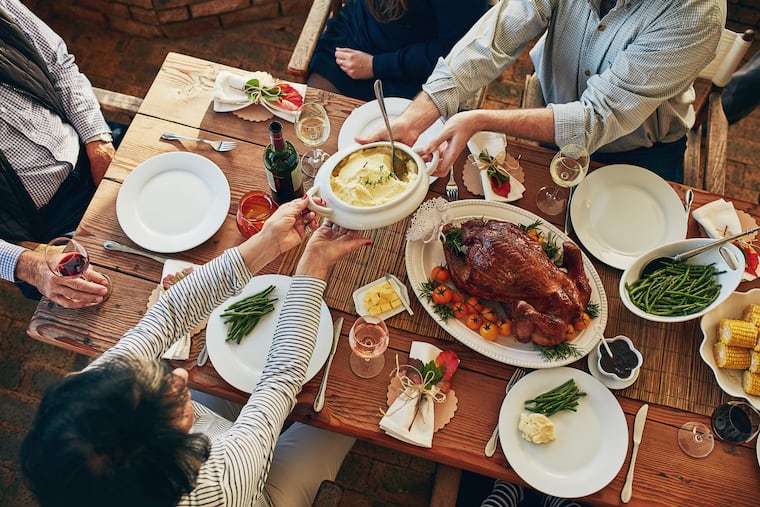6 tips to navigate the holidays with intuitive eating
The holidays also often spark diet and weight talk, with people fearful of holiday foods and of weight gain.

Holiday season is upon us, which may bring a range of emotions including excitement, anxiety, joy, and/or sadness. The holidays also often spark diet and weight talk, with people fearful of holiday foods and of weight gain.
This year, in particular, there’s an understandable fear of weight comments from loved ones we may be seeing for the first time in more than a year. Below are tips from the principles of intuitive eating to help you navigate those challenges and make the most of this holiday season.
1. Ditch the diets for good. Dieting causes stress mentally because we think we have to avoid our favorite foods, and it causes stress on our bodies physically because they are not getting the consistent nutrition that they need to help us feel energized and perform essential functions. Ditching diets allows you to stop feeling guilty over how you eat and enjoy the holiday food.
» READ MORE: These ‘anti-diet’ dietitians want to help you improve your relationship with food
2. Tune in to your body’s needs. Try to listen to your body’s cues signaling hunger, fullness, and satisfaction. Practice listening in a nonjudgmental way. Just get curious about what your body is asking for and how different behaviors affect your body. Maybe you learn you aren’t getting enough sleep. Maybe you learn that you’re going too long without food so you end up cranky and unable to focus. Maybe you realize that you could use a wider variety of ways to manage stress so food is not your only form of stress management.
In order to make effective changes, you need to start listening to your body this holiday season.
3. Stop skipping meals. In preparation for big holiday dinners, many of us have been guilty of skipping earlier meals to “save our appetite and calories” for the main event. But this leads to primal hunger — which happens when your body needs food urgently to survive — and makes you more inclined to eat far beyond comfortable fullness the next time food is available.
Your body doesn’t know that the lack of food was due to intentional restriction and not a famine, so it’s going to help you get in all the energy it can in case food isn’t available again for a while. Eating consistent meals and snacks helps your body trust that food is available and promotes reliable hunger and fullness cues.
4. Ditch all-or-nothing thoughts. So many of us get caught up in black-and-white thinking. It happens when you go from strict diet days to “cheat days,” which function as planned binges. It happens when you cut foods out entirely or eat all of them when they’re available at a party. It happens when you’re either perfectly tracking your caloric intake or deleting the tracking app and eating everything in sight.
These behaviors are reflected in the binge-restrict cycle. By breaking that cycle, you can find consistency somewhere in the middle ground that allows you to live a fuller life not focused on food and weight.
5. Consume cultural foods. We’ve heard our cultural foods — such things as white rice and fried plantains — demonized in mainstream nutrition spaces and are told we need to cut back on them. So many people have cut out the foods that mean the most to them because they think they’re ruining their health. But our foods provide plenty of value: nutritionally, culturally, communally, spiritually, mentally, emotionally.
These foods helped our ancestors survive, and they reflect the beautiful culture passed down to us through our families. You deserve to participate in your cultural traditions. Don’t let diet culture take that from you this holiday season.
6. Set boundaries. Setting boundaries can be intimidating, but they also can be invaluable, especially around the holidays. We all know the holidays can come with family members commenting on our body changes and our food choices. We get criticized for gaining weight, but we also get criticized when we don’t eat as much as our abuelas want us to. Set boundaries with your family ahead of time. Try such tactics as changing the subject or asking questions to invite them to think more about how their comments might lead to hurt.
Instead of allowing food to stress you out and cause anxiety, learn to focus on what makes you feel good, both physically and mentally. This holiday season, enjoy the cookies, the traditional dishes and, most important, the time with your loved ones.
Isabel Vasquez is a registered dietitian with Nutritiously Yours, a Philadelphia-based bilingual nutrition counseling service offering virtual consultations. Find her on Instagram at @isabelvasquezrd. Dalina Soto is a registered dietitian and founder of Nutritiously Yours. Find her on Instagram at @your.latina.nutritionist.